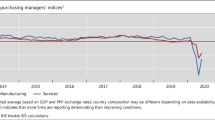
Overview
- Provides a historical overview of economic, fiscal and financial crises since the 1600s
- Breaks down the concept of a black swan event in economic terms
- Provides lessons that would be useful in creating strategies to recover from future crises
Part of the book series: Accounting, Finance, Sustainability, Governance & Fraud: Theory and Application (AFSGFTA)
Access this book
Tax calculation will be finalised at checkout
Other ways to access
About this book
The first part of the book discusses the crisis models in order to allow the reader to better understand the financial, fiscal and economic crises that are detailed in the following chapters. Each chapter starts with an overview of the crisis in question followed by an analysis of the impact on the affected countries. They go on to highlight the causes of the crisis in question, the fiscal and financial measures employed to recover from it and ends on a description of the post-crisis period.
Given the profusion of black swan events that the 21st century has already witnessed, this book would be a valuable read for academics and students of economics as well as practitioners and policy makers.
Similar content being viewed by others
Keywords
Table of contents (6 chapters)
Editors and Affiliations
About the editor
In 2006, she won the Harvard University Project scholarship and worked as a visiting professor at Harvard University. In 2009, she received a scholarship from the Swiss Government for a post-doctorate degree in economics at the University of Neuchatel/Switzerland, and taught courses at Bern Universities. She then began to work in the fields of experimental economics and game theory, and for three consecutive years as a guest lecturer in the economics laboratory of the Montpellier University in Montpellier, France. Afterwards, she went to Missouri University, Indiana University and Arizona University with a scholarship from Missouri University. She then worked as a visiting professor at the University of East Anglia and took some courses from Exeter Universities in the UK with a Tubitak scholarship.
She has published books, articles and papers on foreign direct investments, economic growth, panel econometrics, experimental economics and game theory. She is currently working at the Department of Public Finance and Financial Management at Izmir Katip Çelebi University/Turkey. In addition, Açıkgöz teaches at the Department of International Trade and Finance at Izmir University of Economics/Turkey and the Department of Economics at University of Life Sciences in Poznań (Uniwersytet Przyrodniczy w Poznaniu)/Poland.
Bibliographic Information
Book Title: Black Swan: Economic Crises, Volume I
Editors: Bernur Açikgöz
Series Title: Accounting, Finance, Sustainability, Governance & Fraud: Theory and Application
DOI: https://doi.org/10.1007/978-981-19-5252-4
Publisher: Springer Singapore
eBook Packages: Economics and Finance, Economics and Finance (R0)
Copyright Information: The Editor(s) (if applicable) and The Author(s), under exclusive license to Springer Nature Singapore Pte Ltd. 2022
Hardcover ISBN: 978-981-19-5251-7Published: 24 October 2022
Softcover ISBN: 978-981-19-5254-8Published: 24 October 2023
eBook ISBN: 978-981-19-5252-4Published: 23 October 2022
Series ISSN: 2509-7873
Series E-ISSN: 2509-7881
Edition Number: 1
Number of Pages: XIII, 94
Number of Illustrations: 16 b/w illustrations, 4 illustrations in colour
Topics: Public Economics, Public Administration, Economic Policy



